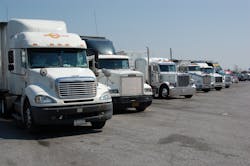UPDATED GE Capital Survey: Fleets aim to add vehicles; interest in alt-fuels rising
Updates to this news eport appear in bold type:
This report has been updated; A new biannual GE Capital survey of 413 executives with responsibility for company fleets at middle-market firms (sales from $10 million to less than $1 billion) reveals that nearly one-third (27%) expect to increase the size of their fleets in the next 12 months.
The willingness to now start growing fleets is perhaps explained by other findings of the “Fleet Market Economic Outlook” survey.
For starters, exactly half of the companies responding said they expect the industries that their firms are engaged in will expand in the coming year.
The executives’ responses also indicated that:
- Capital expenditures are expected to be greater in 2014 by 39%
- Margins are expected to increase in the coming year by 42% of the respondents
- Financing for equipment over the next 12 months is being considered by 40% of the respondents and for truck or car financing by 25%
- Nearly half (48%) of those surveyed said their firms will add workers. Employment at these companies is expected to grow at an average rate of 3.0% year-over-year
The survey also discerned a marked shift in focus to alternative-fuel vehicles (AFVs). While a mere 4% of the companies surveyed currently field AFVs, nearly half (48%) reported they plan on adding green vehicles “in the coming years.”
Of those firms, 64% said they are planning to add AFVs in the next two years. And 92% reported they will bring them into their fleets within the next five years. According to GE Capital, “many [fleets] are considering AFVs to reduce the impact of rising fuel costs.”
“There are a number of factors driving customers to look at adding alternative fuel fleets in the future,” James Thompson, strategic consulting manager at GE Capital Fleet Services (GECFS) told FleetOwner.
“As the industry works out the challenges of having electric charging and CNG refueling infrastructures in place, for example, many companies are slowly starting to adopt alternative fuels in regional pilots to test out options that might work out best for their fleets in the future,” he explained.
Thompson also pointed out that even as fleets pilot new options, infrastructure is growing quickly. He said that will help make more of the alternative fuels available financially as well as make them operationally viable.”
“In the meantime,” he said, “we are seeing a move to more fuel-efficient gasoline vehicles among our own customers as well as a very recent trend of more customers switching to hybrid technology as the total cost of ownership of those vehicles has become very competitive vs. regular gasoline vehicles.
“As infrastructure continues to develop and costs of alternative-fuel vehicles drop,” Thompson summed up, “we would expect to see the conversion rate to increase substantially over the next few years.”
GE Capital also found that leasing is perceived by the respondents as the “most popular” avenue for obtaining new vehicles. Leasing was cited by 30% vs. the 28% of respondents who said they prefer using cash on hand.
The survey revealed that the “top three concerns” facing the executives surveyed are: the cost of healthcare, having the ability to maintain margins and having the ability to continue to grow revenue.
That finding tracks with what executives at middle-market firms engaged in trucking had indicated as driving their “key challenge,” in a separate GE Capital survey released last month.
As for fleet-specific concerns, GE Capital said the respondents identified “the primary objectives of leadership” as:
- Reducing maintenance costs— especially as fleet size increases
- Cutting fuel costs— mainly via both “right-sizing” and bringing alt-fuel vehicles into service
A GECFS spokesperson described “right-sizing” to FleetOwner as the “the process of evaluating a fleet’s needs and vehicle usage requirements to help maximize fuel cost savings while minimizing maintenance costs.”
Not surprisingly, the respondents reported that the largest increases in fleet-related costs incurred in the past year were for fuel and maintenance.
Per GE Capital, maintenance cost hikes were driven primarily by the upkeep required for older vehicles and unscheduled repairs.
On the other hand, two-thirds of executives overseeing vehicle fleets indicated that their firms witnessed “improved performance vis à vis a year ago.”
Looking ahead, just over half of companies with fleets (51%) said that they see fleet costs increasing this year, according to GE Capital, with “very few expecting costs to decrease.”
